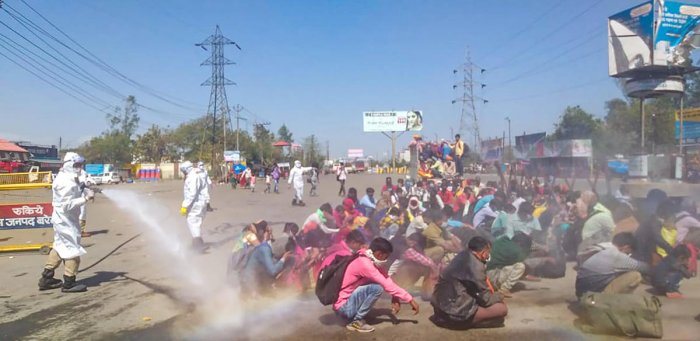
Spraying disinfectant on people harmful: Health ministry

Irked over incidents where disinfectant was sprayed over people as part of COVID-control measures, the Union Health Ministry has issued an advisory against such a step, saying it was physically and psychologically harmful.
Even if a person is potentially exposed to the COVID-19 virus, spraying the external part of the body does not kill the virus that has entered the body, the ministry’s statement said, adding that there is no scientific evidence to suggest that they are effective even in disinfecting the outer clothing/body in an effective manner.
Related news: TN asks collectors not to set up disinfectant tunnels
The ministry said it has received many queries regarding the efficacy (if any) of use of disinfectants such as sodium hypochlorite spray on individuals to disinfect them.
“The strategy seems to have gained of lot of media attention and is also being reportedly used at local levels in certain districts/local bodies,” the ministry said.
Disinfectants are chemicals that destroy disease-causing pathogens or other harmful microorganisms. It refers to substances applied on inanimate objects owing to their strong chemical properties.
Chemical disinfectants are recommended for cleaning and disinfection only of frequently touched areas/surfaces by those who are suspected or confirmed to have COVID-19. Precautionary measures are to be adopted while using disinfectants for cleaning like wearing gloves during disinfection.
Related news: COVID disinfectant tunnels may harm humans more than the virus
“Spraying of individuals or groups is not recommended under any circumstances. Spraying an individual or group with chemical disinfectants is physically and psychologically harmful,” it said.
Spraying of chlorine on individuals can lead to irritation of eyes and skin and potentially gastrointestinal effects such as nausea and vomiting. Inhalation of sodium hypochlorite can lead to irritation of mucous membranes to the nose, throat, respiratory tract and may also cause bronchospasm, the advisory said.
Additionally use of such measures may in fact lead to a false sense of disinfection and safety and actually hamper public observance to hand washing and social distancing measures, it stated.
Related news: When drones took over sanitation workers to spray disinfectants


